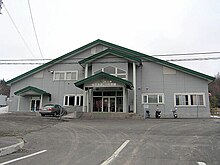영양수준지수
Trophic level index영양수준지수(TLI)는 뉴질랜드에서 호수의 영양상태 측정으로 사용된다.[1] 영양주가지수와 비슷하지만 뉴질랜드에 맞는 대안으로 제시됐다.[2]
이 시스템은 네 가지 기준인 인과 질소 농도를 사용하며, 시각적 명료성과 알조 생물총량이 균등하게 가중된다.[3]
| 호수형 | 영양 수준 | 클라 (mg m−3) | 세키 깊이(m) | TP(mg P m−3) | TN(mg Nm−3) |
|---|---|---|---|---|---|
| 극미량 | 0-1 | 0.13-0.33 | 31-24 | 0.84-1.8 | 16-34 |
| 미생물의 | 1-2 | 0.33-0.82 | 24-15 | 1.8-4.1 | 34-73 |
| 과두영양증 | 2-3 | 0.82-2.0 | 15-7.8 | 4.1-9.0 | 73-157 |
| 중생성 | 3-4 | 2.0-5.0 | 7.8-3.6 | 9.0-20 | 157-337 |
| 에우트로시즘 | 4-5 | 5.0-12 | 3.6-1.6 | 20-43 | 337-725 |
| 초영양성 | 5-6 | 12-31 | 1.6-0.7 | 43-96 | 725-1558 |
| 비후성 | 6-7 | >31 | <0.7 | >96 | >1558 |
참고 항목
외부 링크
참조
- ^ 뉴질랜드 환경부 2010-05-22 웨이백 기계 - 호수의 영양 수준 지수 보관
- ^ Burns, Noel; Graham Bryers; Eddie Bowman (March 2000). Protocol for Monitoring Trophic Levels of New Zealand Lakes and Reservoirs. Retrieved 9 May 2017.
- ^ Burns, Noel; McIntosh, John; Scholes, Paul (2005). "Strategies for Managing the Lakes of the Rotorua District, New Zealand". Lake and Reservoir Management. 21 (1): 61–72. doi:10.1080/07438140509354413. S2CID 86767838.


